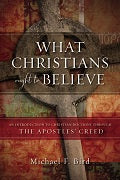You cannot read the New Testament apart from some tradition. Even the most jiving and thriving of Pentecostal churches has a normal way of doing Sunday morning worship that does not jump directly from the pages of the New Testament. This normal way of doing worship, how they organize everything from songs to sermons, is a type of tradition too.
Inasmuch as we all have a “tradition,” the creeds arguably provide the best tradition within which to read Scripture. This is because the creeds should be regarded as a biblically generated tradition that meets with the consensus of the universal church about what the main teachings of the Christian faith are. The creeds constitute an attempt to guide our reading of Scripture by setting out in advance the contents and concerns of Scripture itself. The creeds provide a kind of “Idiot’s Guide to Christianity” by briefly laying out the story, unity, coherence, and major themes of the Christian faith. In that sense, a creedal faith is crucial for a biblical faith and vice versa!
Meet the Ecumenical Creeds
There were many creeds and declarations about doctrine made by leaders in the ancient church. However, the most famous creeds, because they were the most widely utilized, are generally known as the three ecumenical creeds and the Chalcedonian definition. These statements of faith are all upheld by the Western church, that is, the Catholic and Protestant churches.
- Apostles’ Creed (Date: ca. AD 200)
- Niceno-Constantinopolitan Creed (Date: AD 325, 381)
- Chalcedonian Definition (Date: AD 451)
- Athanasian Creed (Date: ca. AD 500)
Our focus in What Christians Ought to Believe will be the Apostles’ Creed. The Apostles’ Creed is the faith that all professing Christians should know, what all pastors and priests should teach, and what all bishops and theologians should defend.
Why Our Churches Need the Creeds
Do we need to know, learn, or even recite the creeds to maintain a biblical and orthodox faith?
Learning the creeds helps us to grow a truly biblical faith!
The best thing about the creeds is that they conveniently sum up the main truths of the Christian faith and put them into a concise narrative that is meaningful and memorable. Viewed this way, the creeds are a portable story, a short summary of the scriptural story line that we can carry with us everywhere we go.
A creed is not simply a checklist of things I’m supposed to believe, but a synopsis of the entire sweep of redemptive history that narrates a sequence including God, creation, redemption, and consummation. By its very structure, the creed compels us to see our faith as part of a bigger picture, as part of God’s grand purposes, rather than single out one or two pet topics to be myopically treasured.
Each line of a creed is also like a travel bag from which we can unpack more scriptural teaching about any given topic. So for instance, the statement, “I believe in the Holy Spirit,” not only affirms that there is a Holy Spirit but presupposes a lot of things that we are expected to know and teach about the person and work of the Holy Spirit. So the creeds actually force us to delve deeper into what can be known and learned about a given topic.
How Creeds Can Invigorate Your Faith
The creeds are among the best ways of promoting unity and fellowship with other believers. Despite the many differences among Christians, the creeds constitute emblems of the biblical faith that are professed by Christians of all traditions, denominations, and backgrounds. The creeds emphasize what we have in common rather than what separates us.
Second, the creeds remind us who we are as Christians and that we are part of God’s plan to gather his people around himself and to bring all of his children into his new creation. When we recite the creeds, we are saying that this is what we, the church, believe about God, creation, Jesus, and the life of the age to come. This is who we are! The creed is thus a political manifesto: it declares to the powers that be—or pretend to be—that we are the people defined by this story, the story of God, the reign of Jesus, the experience of the Spirit, and the hope of the world to come.
— by Michael Bird, adapted from his new book What Christians Ought to Believe: An Introduction to Christian Doctrine through the Apostles’ Creed. Find more ways the creeds can invigorate your faith in the book.
How to Use This Book
Enhance your understanding of the Christian faith by viewing Christian doctrine through the most powerful of lenses: the Apostles’ Creed. In What Christians Ought to Believe, new Christians will gain an exciting view of Christianity’s core teachings; mature Christians will gain an inspiring view of the riches of the Christian faith.

